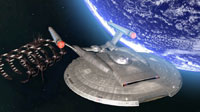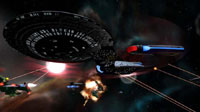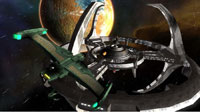

Star Trek Legacy Review 242
Since late last month, I've been playing with the Xbox 360 title Star Trek Legacy. The fact that it is not a great game should be no surprise. Despite some entertaining plot elements, the title's gameplay leaves a lot to be desired. What is confusing, and troubling, is that this is just the latest in a long line of disappointing Trek games. Looking back on the history of Star Trek gaming, games like Elite Force or A Final Unity stand out from a disturbingly large field of titles that over-promise and under-deliver on the well-loved Trek universe. Why is it so hard to make a good Trek game? Why do developers keep trying and failing? Why is there a Vulcan leading the Borg? Read on for consideration of each of these questions, and a review of Star Trek Legacy to boot.
- Title: Star Trek Legacy
- Publisher: Mad Doc Software
- Developer: Bethesda Softworks
- System: 360 (PC)
As so often happens with a Trek title the premise, at least, is compelling. Commanding a task force of up to four ships, you follow a fairly coherent plot from the "Enterprise" era all the way through to the time of Jean-Luc Picard and Benjamin Sisko. You can choose between a number of ship classes to include in your fleet, and gameplay consists of real-time ship-to-ship battles. The actors who portrayed the captains in the various eras make a return, offering their vocal talents and a feel of authenticity to the proceedings.
What sounds like a can't-miss formula, though, inevitably flies past the target at full impulse. Ship and fleet control is the most notable failure, and results in individual combat moments requiring more effort than feels right. I found fleet combat most frustrating, as it is so variable how your actions are interpreted. When you begin a mission, all four of your ships are taking orders from you at the same time. Selecting a enemy for combat (by hitting the right shoulder button and cycling through the available options) is intuitive and quick. When all four ships are following your orders, this results in a focused barrage that effectively neutralizes targets. The problem comes when ships begin 'thinking' on their own.
It was never clear to me what prompted this, though I know that giving individual ships orders via the overhead tactical display (available via the 'select' button) always 'broke up' the fleet's command. This is problematic, as the 2D overhead display is the best way to keep track of the action on the sometimes dauntingly large 3D space maps Legacy uses. Indeed, the z-axis is used in the game (unlike in the show), making it hard to keep track of enemy ships on occasion. These are challenges, though, to be overcome: the frustration sets in when order-less ships choose to sit dead in space and absorb phaser hits without retaliating. That's some extremely poor decision-making on the part of the AI, and can mean the difference between success and failure in a large and frantic naval battle.
Another, subtle frustration is the pathing your friendly ships use when circling a target. While sometimes ships do 'the right thing' and orbit their prey at an appropriate range, trying to keep weapons locked on the target at all times, that's not always a given. Often, ships locked onto a target attempt something I can best refer to as a 'strafing run', where they move directly at a target, allowing firing on the enemy for a brief period of time, before overshooting and swinging around for another pass. Overshot on targets can sometimes be quite some distance, resulting in a long delay between assaults on enemy ships. This style of attack is particularly frustrating when attacking immobile targets like space stations and asteroids, as AI-controlled ships tend to fly right into their prey and sort of bounce off. Given the finicky targeting you're allowed to use, this greatly reduces an AI-controlled ship's effectiveness against such a target. In a pitched battle, which is almost all of them, it just becomes frustrating to have to keep so many balls in the air.
That's a shame, too, because combat is actually a lot of fun when things are moving in the right direction. It's extremely easy to jump from ship to ship within your fleet, simply by pressing one of the four directions on the D-pad. This can (generally) allow you to keep all four of your ships active and flying straight. Weapon use is as simple as right trigger for phasers, left for photons. The game does a good job of informing you when weapons can be used, both via visual HUD elements and vocal alerts. Legacy also does a great job of switching up who you're fighting, and what exactly you're doing in combat. Sending away teams onto a space station in the middle of a pitched battle, for example, or using a sensor scan to detonate an explosive keeps you on your toes and stops things from getting overly monotonous.
The plot that strings these combat elements together is all the Trek you can stand, and more, crammed into a disappointingly short timespan. There is time travel, Klingons, Romulans, Borg, and one very weird Vulcan. The plot itself is explained in detail in a comic included as an 'extra' on the game's main menu. To give you a horrible taste, it mentions V'ger, from the first Star Trek movie, in connection with the Borg's origin. Looking back on the whole story from the last mission gives you an 'ohhh' moment, but it's not that great a payoff for the amount of time you spend in the dark. Just the same, overall the story is coherently told and entertainingly written. The dialogue written for the captains is especially entertaining; even the stuff written for Shatner (who, predictably, gets the most 'screen time') is enjoyable in a scenery-chewing kind of way. Getting to hear Avery Brooks intone new lines as Benjamin Sisko was especially enjoyable, and the role DS9 gets to play near the game's end allowed me to forgive a lot of smaller oversights.
Visually, Legacy is a competent 360 title. It's certainly not Gears-pretty, but the ships are all well modeled, and it's hard to make space look ugly nowadays. Ships and stations explode nicely, though larger objects tend to look a little odd when breaking apart. Audio effects use official FX from the show, and the score consists of forgettable Trekesque tracks that back the game's sometimes-tense moments adequately.
Star Trek: Legacy, then, allows the dedicated Trek fan to experience ship-to-ship combat in a way that's never quite been captured so well before. Trekkies are sure to appreciate that new experience, as well as the vocal work of the actors-turned-captains. As a game, though, Legacy leaves a lot to be desired. Gamers are going to find the inexact fleet control and inept AI frustrating, with some missions being bang-your-head-against-the-desk annoying. The first Next Generation-era mission, Revelations, is particularly hair-pulling, and makes the lack of in-level save points sorely missed. If the lack of a new Trek show on TV is leaving you anxious, I would readily recommend Legacy as a balm to your Trekkish needs. Likewise, the game might be worth a rental of you're a 360 gamer who has already tired of Gears of War. It's just not that great a game otherwise, and can readily be given a miss for other, better games.
This leaves us with the question I posed above, though: Why is it so hard to make a good Star Trek game? It could be the difficulty of making licensed games satisfying to players outside of the 'fan' population ... but Star Wars titles like Knights of the Old Republic and Jedi Academy transcend fandom as truly great gaming experiences. Heck, even Spider-Man 2 is a better game than any Trek game I've played, and Spidey's history with gaming is a lot shorter than Star Trek's. Given the dialogue and narration-heavy storytelling that Star Trek uses, it is possible that the Trek universe just isn't a good fit for videogames? What does the lackluster performance of these latest Bethesda titles mean for future trek games? Star Trek Online, specifically, seems to have a Herculean task before it. How do you bring a license that's never seemed to be quite right for gaming to one of the most finicky of all genres, the MMOG?
What do you think? What would it take to make a great Trek game? Are there any Trek games that you think have really succeeded? What will Star Trek Online need to include in order to satisfy you?



Why is it so hard to make a good Star Trek game (Score:5, Insightful)
It also has to be delivered on-time and on-budget.
The old DOS era adventures rocked (Score:2, Insightful)
Comment removed (Score:3, Insightful)
Re:Why is it so hard to make a good Star Trek game (Score:5, Insightful)
netrek for the win :) (Score:2, Insightful)
Re:"Why is it so hard to make a good Trek game"? (Score:3, Insightful)
Since none exists after TNG, I'd say you have that correct.
Actually, in fairness, DS9 lasted another five years after TNG, but started a year before TNG ended, so gets a pass.
But you make a good good point, if accidentally - Voyager and Enterprise both threw away everything that made the franchise great, and they managed to all but ruin Star Trek for a generation. Analogously, most games try to make Trek into something more like the style of Voyager and Enterprise, and almost ubiquitously fall flat.
Mark my words, when a new Star Trek series eventually comes back in a decade or three, they will pretend those two never happened (or at best, give a not to Voyager for opening up the Delta quadrant, but basically ignore most of the episode development).
Re:i don't get it (Score:3, Insightful)
Oh, it will sell well. What game publishers truly hope for, however, is the license to make the game play well on name recognition alone.
What, no Netrek? (Score:4, Insightful)
Re:Action & Adventure vs Philosophy (Score:4, Insightful)
Galactic Civilizations has some cool elements, but it lacks the artistic style and coolness and, in some ways, the intelligence of BOTF.
There's are two major problems (Score:5, Insightful)
a) The single most overwhelming problem (which has also hamstrung *every* series and film after TOS) is the question of how much you should try and simply appeal to the established fanbase vs. how much you should try and do outreach to new audiences/go in new directions. Rick Berman's inability to balance this issue was, more than anything else, the single main thing which killed Voyager and Enterprise in the end. With Voyager to a large degree he simply ended up adopting an attitude of, "screw the base," and focused purely on trying to draw new audience, whereas with Enterprise he tried to appeal more to the base at times, but was still unable to balance the issue. I think also the problem is that a balance isn't really possible...you basically have a scenario where the earlier/more conventional series had a philosophical basis of fairly heavy pacifism on the one hand, but where there was a transition period during DS9 in particular where violence started being incorporated more and more as a regular part of the show, until you got to the level of around fifth to seventh season Voyager which regularly had episodes that played like low-budget versions of the Lethal Weapon movies in space. Elite Force in particular was able to use that to its' advantage, and that alone is probably the main reason why that's been one of the only two Trek games (the other having been A Final Unity) that could be called an unqualified success.
Looking at it now, I think the lesson is that because each series had such a fundamentally different approach to the issue of violence, in a game or movie you can't mix series. If you're going to do a Voyager game for instance, you can make an FPS and have it as violent as you want. A Voyager game also wants a heavily postmodern, gritty, and also fairly multi-ethnic feel, with adolescent sexual angst between Tom and BE'lanna, comic relief from the Doctor, Chakotay doing his stereotypical Red Man schtick, and lots of Janeway's trademark moral ambiguity and gleeful abuse of authority.
A TNG game on the other hand *has* to be something like A Final Unity; an almost entirely non-violent puzzle-solver. A TOS game could have some degree of violence, but it has to be 60s oriented and cowboyish in nature, which means unarmed fisticuffs for the most part. The Utopian/"universal peace" vibe doesn't have to be as strong for a TOS game as for TNG either, but a certain amount of it doesn't hurt. I thought Starfleet Academy got it right in terms of having an Andorian as one of the students, as well. That sort of unobtrusive in reference helps to keep the autistic geek base happy, and won't upset normal audiences *too* much if it isn't overdone. Of all of these, DS9 is probably the trickiest to get right, which probably also explains why it hasn't been done successfully in a game. A DS9 game could have a certain amount of violence, but it needs to be kept restrained a subtle way. (Odo's restrained use of martial arts with carefully and clearly performed hand strikes are a good example of what I'm talking about, here) The idea with DS9 is that of a society which has traditionally been pacifist, but which is in the process of discovering that violence is something of a necessity on the basis of self-defense. The seventh season episode, "The Siege of AR-558," is probably the best example of what I'm talking about, there.
b) I get the feeling that in some cases, game design houses possibly (if only subconsciously) had the attitude that because they were doing a Trek game, it probably wasn't going to achieve more than cult popularity anywayz, and so therefore there wasn't much point in making sure that it was a truly quality game. If you're going to do a strongly character/story oriented Trek game, then yes, there is a fairly strong possibility that you're not going to hold much appeal outside the base. Howe
Interplay Succeeded. (Score:3, Insightful)
Re:Kirk (Score:2, Insightful)
Re:Why is it so hard to make a good Star Trek game (Score:3, Insightful)
Wow, keen insight there...
I think the OP was trying to get at why it seems to be harder to make good Trek games than say, good Star Wars games. They're both games, so by your logic they should be equally different to make. But there are quite a few good Star Wars games, but only a handful of good Star Trek games. What's the difference?
Re:i don't get it (Score:3, Insightful)
Star Wars has a much more loosely defined universe, and consequently it's easier for game designers to be imaginative. Star Trek has an OCD fanbase who knows every single detail of every character, race, and ship that was ever referenced, even tangentially, in any Star Trek episode, ever, and they're going to be pissed if there are inconsistencies. There are a few of those people in the Star Wars camp as well, but there just isn't the same sort of detail for them to pore over. Also Star Wars is a pretty straightforward hack-and-slash universe, while Star Trek is ostensibly about finding creative solutions to complex problems (or unnecessarily complex solutions to ridiculously outlandish problems, if you're a skeptic). The latter doesn't translate into a game very well.
Re:Action & Adventure vs Philosophy (Score:3, Insightful)
Hence the mention of A Final Unity, which was basically a point-'n-click adventure game in the SCUMM mould. There was occasional ship-to-ship combat, but much of your time was spent flying from planet to planet and conducting away missions, while unlocking the mysteries of the ancient civilisation and their Unity Device. Like KOTOR, but a different universe :-)